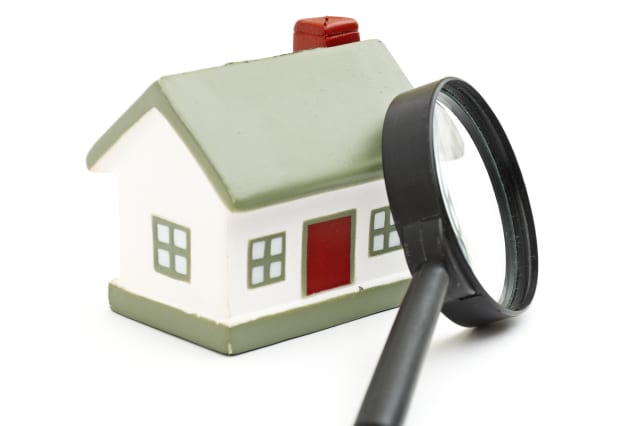Filed under: Buying, Home Improvement, Selling

For a first-time home buyer — and even for repeat buyers — hiring a home inspector can be a last-minute task the buyer is unprepared for.
Depending on the seller, you may have only a few weeks to find, schedule and get a report from a home inspector to show what types of problems a home might have. This can include checking electrical and plumbing systems as well as the foundation, among many other things. It’s not a job you want rushed.
Many home inspectors are recommended by a buyer’s real estate agent, which can come in handy if you’re pressed for time. But if you’re looking to save some money when hiring a home inspector — a job that can cost $350 to $1,500, depending on your location and the extent of the inspection — then it can be worthwhile to shop around. Even a newly built home needs an inspection.
It’s also worth considering hiring specialists, such as plumbers and electricians, to check areas of a home that the inspector may flag as needing additional work.
“Having a home inspector is like going to your general practitioner, your family doctor,” who will refer you to a specialist if needed, says Frank Lesh, the executive director of the American Society of Home Inspectors and a home inspector in the Chicago area for 25 years.
Unlike a specialist, who will look at specific areas, a home inspector will look at a house as a whole system. A problem in the attic, for example, could be caused by something in the basement, Lesh says, such as moisture in the attic being caused by a leaking vent from a downstairs bathroom.
Even after living in a house for a while, it’s worthwhile to get a home inspection to see how the house is holding up, says Lesh, whose organization offers help in finding a home inspector. “There’s no ‘check engine’ light on a house,” he says.
Check Them Out
Buyers should check the credentials of the home inspector they’re hiring, especially if the inspector comes recommended by their real estate agent. If a home purchase deal falls apart because of problems found in a home inspection, the agent won’t sell the house and earn a commission, says Bennie Waller, a professor of finance and real estate at Longwood University in Farmville, Virginia.
If there are concerns about a specific system — such as a pool, HVAC unit or septic system, for example — then it can be worth the extra cost to hire an expert, Waller says.
Hiring an inspector is cheaper than hiring a specialist in each trade, though a structural engineer, for example, could be hired to check the foundation if the inspector finds initial problems, says Lance Luke of Construction Management Inspection in Hawaii.
“Ask about the inspector’s experience, qualifications, references, certifications, memberships in local and national home inspection associations, and licensing,” if the state requires it, Luke says.
“Specifically, ask how many years has the inspector been doing home inspections full time,” he says. “Many inspectors say they have been in the construction or contracting field for 30 years. But they may not have been a true home inspector for the same amount of time. Thirty years in the building or engineering business does not automatically make for a good home inspector.”
Also ask if they carry “errors and omissions” insurance, and verify the amount of coverage, Luke says.
Ask if you can attend the inspection and if the inspector will walk you through the property after the inspection is completed, he says.
Seek Documentation
A good home inspector should provide a thorough report, says Jacob Gabrie, a broker with the Blackstone Group at Keller Williams Realty in Folsom, California.
“I especially like to refer clients to those that thoroughly document their work because you never know when a real estate deal can go bad, and when they do it often means legal action, so having the home inspector that offers the best documentation possible is best,” Gabrie says.
Reports that include video or digital photographs along with typewritten reports are best, he says. “Any other manner or method won’t help you in the future when the home inspector ‘can’t remember.’ This is often the case. Years down the road an issue pops up and you want this inspection to be worth it and have real value.”
Go Straight to the Specialists
Another option is to forgo the home inspector entirely and pay the extra cost for specialists, says Brent Cumberford, a real estate investor and developer who has paid for a lot of home inspections and subsequently “paid even more for them” after buying a property.
Home inspections often are too superficial, Cumberford says, such as only turning on a furnace or air conditioner to make sure it works, or opening an electrical panel.
“Unless required by my lender, I don’t even bother with a typical home inspection anymore before purchasing a property,” he says.
Instead, he has a licensed contractor inspecting the heating and cooling, electrical, foundation and structure, roof and plumbing. It costs more upfront but saves money on the back end, Cumberford says.
“I learned this lesson the hard way after getting some bad advice from a home inspector,” he says. “I purchased a home knowing it was in need of foundation repair. The inspector told me it wold need minor repairs and would cost $2,000.”
Cumberford bought the property and brought in foundation experts to make the repair, who told him it would cost $10,000 to fix. Paying a foundation specialist $100 during the inspection period would have saved him thousands of dollars.